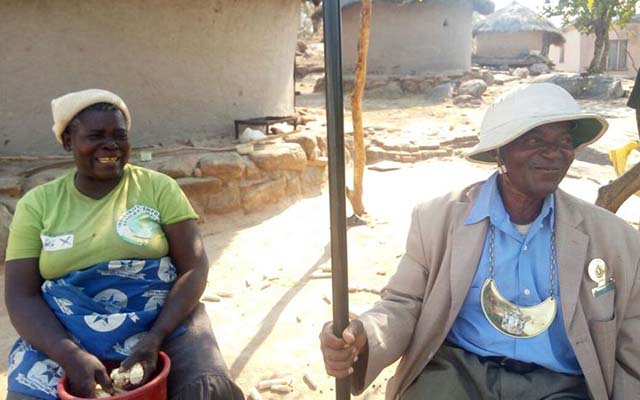Food for Work programme staves off hunger in Mwenezi


Cheif Negari
George Maponga recently in Mwenezi
A few weeks ago, the world woke up to shocking news reports that villagers in the drought-choked Negari communal lands in northern Mwenezi were resorting to hunting and killing baboons to fend off the ghost of hunger. The reports further claimed that the population of the primates in the area was in danger as more and more villagers hunted and indiscriminately slaughtered them to feed their families.What gave the reports a modicum of credibility was the fact that Mwenezi is traditionally notorious for food shortages because of erratic rains. Mwenezi like other parts of Zimbabwe also emerged worse off from the ravages of El-Nino which caused one of the worst droughts in living memory.
Negari communal lands on the northern tip of Mwenezi, which is separated from neighbouring Chivi district by Runde River, was however one of the few areas where villagers salvaged something out of their fields in the last farming season after being blessed with average rains.
Villagers in the area attest that the majority of them at least managed to harvest something from their fields after their area received a series of sporadic rains from the beginning of December last year to March this year.
Besides surviving on their maize and sorghum yields from a rather poor farming season last year, the villagers are also beneficiaries of Government’s Food for Work programme where each household receives a 50kg bag of maize from Government.
The villagers in Negari further dispute reports that they are resorting to eating baboons because of hunger as the Food for Work Programme coupled with food relief operations by various non-governmental organisations have boosted the food security situation in the area.
Chief Negari, Mr Vunganai Tinofirei, says none of his subjects had killed and consumed baboons not only because the food situation was not precarious but also because the primates’ population in his area was very low.
“We were shocked to receive reports that people here were now eating baboons because of hunger but if the truth be told there is a very low population of baboons here while like any other parts of Zimbabwe our area was hit by drought but our people are coping,’’ he said.
“Negari was one of the few lucky areas where villagers managed to harvest something despite last season’s drought and it is shocking to hear that some of my people are now eating baboons to fend off hunger,’’ he added.
Chief Negari said he even had a surprise visit by officials from the Parks and Wildlife Management Authority who wanted to establish whether hungry villagers were eating baboons.
“People from Parks were here and we told them that there was nothing like that (eating of baboons by hungry villagers). Many people are now Christians these days and the habit of eating baboons was abandoned long back.
“Even then people did not eat them because of hunger but because they liked the meat, it was a delicacy,’’ he added.
The Chief said Government and non-governmental organisations were on top of the situation in the battle against hunger such that it would be far-fetched for people in his area to kill baboons for food.
“In the whole of Negari, only two mountain ranges, Manyanya and Chiramba, are home to baboons but even then their population for my people to kill them for food. It is also unlawful to kill baboons for whatever reason, I would not allow that in my area.’’
Chief Negari’s wife, Mrs Keresencia Chimame weighed in saying baboons were last killed for food in their area in the 1980s.
“The Chief assists people in extreme need of food through proceeds raised from Zunde RaMambo. Moreover every household is getting a 50kg bag of maize from Government monthly under the Food for Work programme while NGOs are chipping in with beans and cooking oil. So how would a person hunt and slaughter a baboon for food here?’’ asked Mrs Chimame.
“There are people who might want to kill baboons out of love for their meat but the Chief would never allow such a thing to happen here. That practice(of eating baboons) ended soon after Independence in 1980.’’
Chief Chitanga, Mr Felani Chauke of Mwenezi, said it was shocking that people were peddling false reports of the killing and eating of baboons in a district that was well-catered for in terms of food through joint efforts of Government and NGOs.
“Mwenezi might be a drought-stricken area and currently under a cloud of hunger like other parts of the country but the situation has not reached a level where our people would turn to baboon meat to avert hunger,’’ he said.
“Government is rolling out the Food for Work programme where the able bodied get a 50kg bag of maize after doing some prescribed work like rehabilitating roads and small bridges while the elderly, orphans and other vulnerable people get the maize for free,’’ he added.
Chief Chitanga said Government and NGOs were currently on top of the situation in the battle against hunger in Mwenezi and should be applauded for making sure that no one starves.
“Even the Tokwe-Mukosi flood victims at Chingwizi who have never grown their own crops from the time they were relocated from their original homes in Chivi have not killed and eaten baboons because of hunger because Government and NGOs are doing their best to make sure they get monthly food allocations. Reports that people in Mwenezi are eating baboons are mischievous to say the least,’’ said Chief Chitanga.
Mwenezi district administrator Ms Rosemary Chingwe said the majority of the 160 000 villagers in Mwenezi were getting food assistance from either Government or NGOs.
She said Government’s Food for Work programme had expanded to cover all the 18 wards in Mwenezi while the World Food Programme was scattered across 12 wards.
“In terms of food availability, I must say Mwenezi is currently on top of the situation because we have Government’s Food for Work Programme where each household is getting a 50kg bag of maize monthly while NGOs, most notably the World Food Programme together with Mwenezi Training Development Centre and Red Cross are giving our people maize, pulses, cooking oil and beans. The number of people getting assistance from NGOs is cumulative and we expect it to hit 80 000 by end of next month,’’ said Ms Chingwe.
She added that Government and NGOs were working closely in food distribution to make sure there was no double dipping with villagers drawing food from both Government and NGOs.
“There is no part of Mwenezi that is not covered under food distribution. Reports that people here are eating baboons because of hunger are very untrue.
“Even those who might want to eat them because they love the meat, they might not be able to do so because the baboon population is very small and localised,’’ she added.







Comments